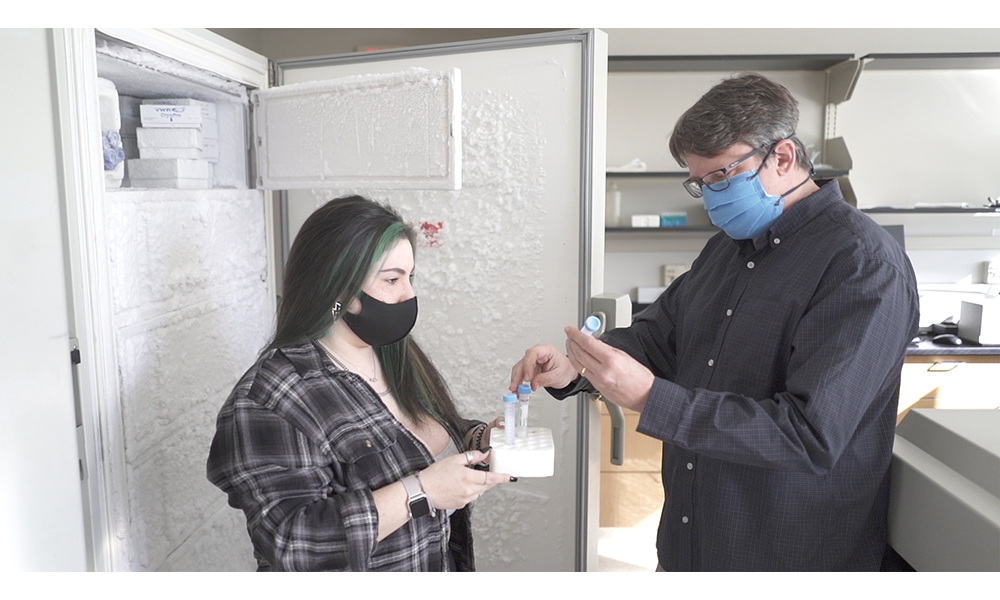Prestigious scholars program pumps life into heart research
JMU NewsA James Madison University sophomore is looking forward to researching a deadly heart disease during the remainder of her undergraduate career after being named the university’s inaugural Beckman Scholar.
Isabel Romov, a biotechnology major from Northern Virginia, will look for ways to treat arrhythmogenic cardiomyopathy, an inherited disease that causes arrhythmias and thickens the walls of the ventricles, the lower chambers of the heart. A study published by The National Institutes of Health states that ACM affects mainly young individuals and trained athletes and can lead to sudden death.
The Beckman Scholars Program provides a 15-month mentored research experience for exceptional undergraduate students in chemistry, biological sciences or interdisciplinary combinations of the chemical and biological sciences. Schools must be invited by the Arnold and Mabel Beckman Foundation to apply for the program. JMU was one of 12 schools across the country, and one of two in Virginia, accepted into the program this year.
Romov will receive $18,600 over 15 months to do the research under the guidance of JMU Chemistry professor Nathan Wright, who is also a biotechnology affiliated faculty member. She also will receive funding to present her completed research at the Beckman Scholars Symposium in Irvine, California in summer 2021.
“Isabel embodies the kind of person Beckman is looking for. She is very smart, works really hard and has a deep motivation to try and solve medical problems from the ground up,” Wright said.
Romov, who has had to find ways to finance her education after the death of her mother from ALS, said, “This makes my education so much less stressful. Now I won't have to scramble for money for tuition or rent.”
The research will involve something akin to building a molecular bandage that will patch up vulnerable areas of the heart, Romov said. ACM causes a defect in proteins that join the cells of the heart muscle together. Ultimately, it affects the electrical pathways through the heart that coordinate the heartbeat and the heart’s ability to pump blood effectively.
“I am thankful that this award is allowing me to pursue research that I care about,” Romov said, adding that she is happy to be in an environment “where the people around me feel the same way and appreciate science the way I do.”
Wright said he hopes Romov will discover a way to slow down ACM. “If she does, we will be able to write this research into a paper that will help other biochemists and clinicians, and also help Isabel go on to the next level.”
With two years of college left, Romov said she does not yet know what she will do after graduating, but possibilities include working for a biotechnology company or continuing her education.
In addition to Romov, the Arnold and Mabel Beckman Foundation funding for JMU will support two students next year and a fourth in 2022. To apply for the program, students have to be biotechnology majors with sophomore standing or above, with at least one academic year remaining. They also need an overall GPA of 3.5 or higher.
Arnold Beckman founded Beckman Instruments, Inc., while on the faculty of California Institute of Technology and created devices that revolutionized the study and understanding of chemistry and human biology.
"If you go in the lab, you’ll see the Beckman name on lots of different pieces of equipment," said Stephanie Stockwell, a professor of integrated science and technology and the director of JMU’s biotechnology major. "He invented a pH meter, he made some spectrometers, these are key pieces of equipment that every lab in chemistry and biology are going to have. Having the Beckman Scholars Program is a seal of approval that we are doing rigorous and in-depth research with undergraduates."
About JMU Biotechnology
Biotechnology at JMU is a 4-year interdisciplinary major leading to a B.S. degree. The program is shared among the Departments of Biology, Chemistry and Biochemistry, and Integrated Science and Technology (ISAT). Students undertake a rigorous curriculum rich with hands-on laboratory experiences, critical analyses of both the "how" and the "why" of biotechnological solutions and the development of transferable skills to keep up in a rapidly changing field. The combination of both scientific/technical depth and cross-disciplinary breadth allows graduates to pursue diverse career paths in industry, government and advanced studies.
Media Contact: Eric Gorton, 540-908-1760, gortonej@jmu.edu

